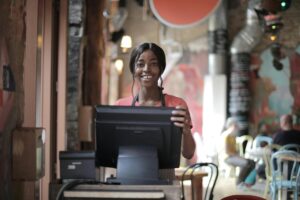Being human is a little messy. It’s safe to say that we’ve all been hurt by the words or actions of others and that we’ve been the person who’s hurt others. It may seem odd to think of forgiveness as something to optimize, but that’s why we’re here. Optimizing forgiveness prevents the inevitable hurts of our world from stealing our peace and joy. We may even begin to notice offenses that used to ruin our day bounce right off without wounding us. Before we dig deeper into how to optimize forgiveness, we need to understand the characters and roles of forgiveness to understand what forgiveness is and is not.
The Characters
The narrators in our minds give meaning to our experiences. Those voices are not necessarily the truth but our brain’s attempt to make sense of what’s happening in our lives. Our narrator often gives the people in our stories titles so we know what to expect and how to interact. I probably don’t need to tell you this can be problematic. We might assign the roles of hero, victim, villain, and extras, but logically we know that people are not one-dimensional. This often means that our narrator gives us the benefit of the doubt, but doesn’t afford others that same grace. Psychology refers to this tendency as the fundamental attribution error.
Which characters in our story might need forgiveness? Let’s start with the obvious. The ones we love, our heroes, often have the power to wound us deeply. It’s painful when people abuse the vulnerability that accompanies our love. Next, our stories’ “extras” are the countless people who cross our paths, whether momentary, temporary, or recurring. They need our grace as much as our loved ones as they create little inconveniences, nuisances, and troubles in our story. We may never get the opportunity to hear origin stories that could give us insight into why they behave in certain ways. Of course, we can’t forget our villains. These people can wreak havoc on our psyche, and it may feel like their full-time job is making our lives more difficult. Extending grace to repeat offenders may be challenging, but relentless forgiveness does not prevent us from creating a few healthy boundaries. Finally, the last character worth mentioning is ourselves. We can disappoint and hurt ourselves in ways no one else ever could. Now that we know our characters, let’s answer the hard question.
Who deserves to be forgiven? Everyone. The heroic parent that lets you down. The unknown driver that cut you off in traffic. The condescending boss that pitches your ideas without giving you proper credit. Every single one of them. Forgiveness may feel costly during the moment, but trust me, freedom is the priceless gift we receive when we choose to forgive.

The Practice
Have you ever heard someone say they want to forgive, but the transgression was so painful they don’t feel like they can? Maybe you know someone who is waiting for an apology so they can forgive an offense. Have you ever felt unable to forgive because the betrayal was so great that you could never trust them again? If so, the problem may be that we don’t truly know what forgiveness is.
Forgiveness doesn’t require our offender’s remorse or apology. It’s not forgetting or condoning someone’s hurtful words or actions. Forgiveness is not a lengthy process dependent upon working through negative feelings. It does not always lead to reconciliation of a relationship or restoration of what was broken. Forgiveness is a decision to release the burdens of tracking offenses. Forgiveness is an expected response after we realize that God loved us so much that He sent his blameless son, Jesus, to pay for the sins of all humanity. Salvation means that the thing you did on your worst day is forgiven. What about those deeply wounding words of our loved ones? Yes, Jesus paid for that forgiveness too. How about some stranger’s selfish decision that changes the trajectory of our lives forever? Yes, that too. The awareness of God’s compassionate love, grace, and mercy despite all our faults compels us to share that love, grace, and mercy with others.
This perspective allows us to find freedom in forgiveness quickly. First, we must have enough awareness to recognize and acknowledge when someone hurts us. The offense may be clear in the moment or God may reveal old wounds stunting our growth. Next, we have to decide to forgive. It is a choice, not a feeling. Feelings usually follow as we obediently walk in faith. Finally, we must commit to walking in freedom by remembering our decisions and choosing to bless/pray the ones who hurt us. Sometimes we must remind ourselves that the offense has been forgiven and the wound healed when triggers from the past threaten to steal our joy.
Forgiveness Starts with Gratitude for God’s Love and Jesus’ Sacrifice.
- Acknowledge the Hurt
- Decide to Forgive
- Live in Freedom
The Optimization
We can optimize our practice of forgiveness even further when we learn how to prevent offenses. I wish it was as easy as asking the people around us to get their lives together, but this is an inside job. As you know, around here we like to focus on the things we can control. Preventing offenses is no different. The secret lies in our expectations. We must manage, communicate, pre-decide, and rehearse.

No one is perfect so if they stick around long enough, they will disappoint you. With that cheery truth in mind, let’s remember to manage our expectations. A little bit of grace goes a long way. The next piece within our power is communicating our expectations. Have you ever put together a jigsaw puzzle without a picture? It’s slow, painful, and requires a lot of guessing. When we fail to communicate our expectations to others, whether a spouse, employee, or friend, we’re expecting them to put together a puzzle without the picture. Let’s not withhold anything that could help make people’s lives easier. Finally, our most powerful optimization is to pre-decide to be unoffendable. This phrase is grammatically problematic, but humor me, because it’s changed my life. One of my daily connection targets is ‘I am graciously unoffendable and forgiving.’ Does this come naturally to me? Absolutely not. Mercy ranked incredibly low on my natural spiritual gifts questionnaire. Do I hit this target one hundred percent of the time? Of course not. I do, however, have a superpower of being graciously kind to rude people, struggling tech supports, and apathetic cashiers. Do you know why? First, and foremost, Jesus. Second, I have spent years pre-deciding every morning to be graciously unoffendable and forgiving by mentally rehearsing kindness before I ever sit down to meet with that rude person, call the clueless tech support line, or walk into the store with the cashier who acts like my business is an inconvenience. This fun, challenging game became easier as it became less about how I behave (behavioral change) and more about who I am (conceptual change). The surprising part is that because of the positive changes in who I am, the rude people became kinder, the support techs went the extra mile to find solutions, and the cashiers began to smile and look forward to helping me. The world is a brighter place when we use our light to find and highlight the best in others, instead of fixating on their faults.
Key Ideas Conclusion:
Writing on forgiveness first came to me after struggling with some triggers that should have been less sensitive after forgiving the people involved during a difficult life season. I realized I was still quick to take offense to certain innocent remarks. Over the years, I learned a lot about forgiveness and I got more practice than I ever wanted. I shared my ongoing struggles with a trusted friend who challenged me to dig a little deeper. One quiet Sunday afternoon while I was sitting on the porch, I realized the person I forgot to forgive was myself. It didn’t occur to me since I was the one wounded, but I disappointed myself by allowing the words and actions of others to have such a negative impact on my mental health. I chose to feel unloved and unchosen by important people in my life, and even though I worked through those past wounds by realigning my identity with the intrinsic value my Creator instilled in me, my work wasn’t finished. I forgave the sabotaging villains, the heartbreaking heroes, and all the extras in between, but I forgot to forgive myself. Looking back I fell short of my mark. Looking back, I see that I was doing my best during the difficult season I was navigating. As we think about who needs our grace today, let’s not forget ourselves. It’s through this forgiveness that we find freedom.
Faith Encouragement
- Dr. Martin Luther King Jr.: “Forgiveness is not an occasional act; it is a constant attitude”
- Matt 6:14-15 – For if you forgive other people when they sin against you, your heavenly Father will also forgive you. But if you do not forgive others their sins, your Father will not forgive your sins.
- Eph 4:32 – Be kind and compassionate to one another, forgiving each other, just as in Christ God forgave you.
Start Forgiveness with Gratitude for God’s Love and Jesus’ Sacrifice.
- Acknowledge the Hurt
- Decide to Forgive
- Walk in Freedom
Optimize Forgiveness with Expectations:
- Manage
- Communicate
- Pre-decide and Rehearse


